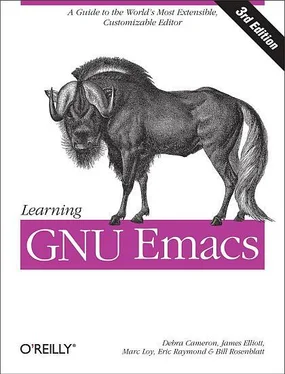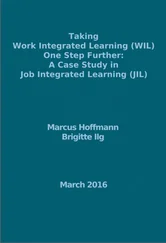Chapter 13. Platform-Specific Considerations
In this chapter, we describe installing Emacs on Unix, Mac OS X, and Windows as well as some of the subtleties of running Emacs on the latter two platforms.
Emacs 21 runs on free Unix systems including Linux and BSD variants as well as on commercial Unix versions such as AIX, Solaris, SunOS,` and Ultrix. It runs on Mac OS X (currently a separate fork, but due to be folded into the main distribution starting with 21.4). It runs on Windows and even on MS-DOS. You can still get ports for Mac OS 8/9 and Amiga (to name only a few). Emacs is truly a multiplatform editor.
We cover installing Emacs on Unix, Mac OS X, and Windows. For Windows and Mac OS X, prebuilt binaries are available. You may want to build Emacs from source in order to obtain the latest version. However, we have found up-to-date binaries online for Windows and Mac OS X; you just have to scout around on the Net to find them. By the time you read this, the sources for the binaries that we cite may be out of date. Check out this book's web site for updated links in that case (http://www.oreilly.com/catalog/gnu3).
A related issue is where to get Emacs. The Free Software Foundation (FSF) is the official source for Emacs, but like most software organizations, official releases are few and far between. Often, building Emacs from CVS sources is the best way to get a leading-edge version. Only you can decide whether you would rather have the latest features—along with some bugs—or download the tried-and-true version from the FSF's site.
Emacs was originally built on a Unix system and continues to run on the multitude of Unix variants out there. We're going to download the latest source and show you how to build Emacs from scratch. It's not really that hard and it has the salutary effect of keeping you up-to-date with future releases.
13.1.1 Where to Get Emacs?
If you can't wait, the primary source for downloading Emacs is http://ftp.gnu.org/pub/gnu/emacs/. Alternatively, you can use CVS to nab the absolute latest build. But more on that in a minute.
13.1.1.1 Downloading Emacs from the Web
You can get Emacs from any one of many sites—as long as your Internet connection is fast enough to transfer a 20 MB file easily. You must also have at least 120 MB of disk space free; this number will certainly grow in future Emacs releases.
The Free Software Foundation maintains a definitive list of all mirror sites. The FSF is the principal sponsor of the GNU Project and it is housed at their site. If you want to look around a bit, http://www.gnu.org/ is the place to start. Or as mentioned earlier, you can just jump directly to the directly listing for Emacs at http://ftp.gnu.org/pub/gnu/emacs/. You should see a list similar to Figure 13-1.
Figure 13-1. The emacs directory at gnu.org
Look for the latest version of Emacs (21.3 in Figure 13-1) and download it.
13.1.2 Where to Put Emacs?
Regardless of where you go to get the source, where you put the files you download is really up to you. For our Unix-based systems, we downloaded everything into /usr/local/install . This is a fine place to start, but if you have a favorite download/development area, feel free to use that. In fact, you can even put everything in your home directory while you're building things.
The only thing to remember is that the build process involves a lot of files that you won't need after everything's done. Make sure you put things somewhere that's easy to clean up when all is said and done.
As for the final destination of the executable, that's also up to you. Most Unix systems (including Mac OS X) will do well to use the /usr/local hierarchy. That directory is both common and the default choice in the build scripts. If you're not on a machine that you have complete control over, though, you can certainly install Emacs into your home directory (or a subdirectory you keep for you own software).
One quick note on using your home directory for the executable version of Emacs: it does make it easy to back up Emacs or transfer it to another machine if you upgrade your system (we know from experience!). However, it can limit who has access to Emacs. If another user works on the same machine and you both want to use Emacs, installing to a common directory (like /usr/local ) is definitely the way to go.
13.1.3 Uncompressing and Unpacking
Now that you have the file, you need to do two things to it before you can actually build Emacs: uncompress and unpack. You can use the tarcommand to do both. Make sure you are in the directory where you downloaded the Emacs file. Type the following command (changing the n to the version number that matches the file you downloaded), and you will see a list of files.
$ tar xvzf emacs-21. n .tar.gz
x emacs-21.3, 0 bytes, 0 tape blocks
x emacs-21.3/AUTHORS, 77854 bytes, 153 tape blocks
x emacs-21.3/FTP, 8950 bytes, 18 tape blocks
x emacs-21.3/INSTALL, 42841 bytes, 84 tape blocks
x emacs-21.3/README, 4046 bytes, 8 tape blocks
x emacs-21.3/BUGS, 1042 bytes, 3 tape blocks
x emacs-21.3/move-if-change, 129 bytes, 1 tape blocks
x emacs-21.3/ChangeLog, 161418 bytes, 316 tape blocks
x emacs-21.3/Makefile.in, 25461 bytes, 50 tape blocks
. . .
This list of created files goes on for quite a while—over 2500 files for Emacs 21.3. If you don't want to see the list, omit the v( verboseoption) from the tarcommand. When this command completes, you have all of the files for Emacs.
Now that any necessary preparations are out of the way, you can go through the steps to build and install Emacs itself.
13.1.4 Downloading Emacs from CVS
As we mentioned earlier, you can also use CVSto pull the source files. The big advantage with CVS is that you get the absolute latest version.
1. Create or switch to a directory where your Emacs build can remain. Don't do this in a temporary directory unless you don't plan on keeping Emacs around. Once there, set up the CVS_RSHenvironment variable:
% setenv CVS_RSH ssh
2. If the setenvcommand is not recognized, you're probably running bashinstead of a csh-derived shell. In that case, use the following command for the environment variable.
$ export CVS_RSH="ssh"
3. Use the cvscommand to grab the source code.
% cvs -z3 -d:ext:anoncvs@savannah.gnu.org:/cvsroot/emacs co emacs
The authenticity of host 'savannah.gnu.org (199.232.41.3)' can't be established.
RSA key fingerprint is 80:5a:b0:0c:ec:93:66:29:49:7e:04:2b:fd:ba:2c:d5.
Are you sure you want to continue connecting (yes/no)?
4. Verify that the public key matches this key:
80:5a:b0:0c:ec:93:66:29:49:7e:04:2b:fd:ba:2c:d5
5. That just makes sure you actually got connected to the right system and aren't being fed some malicious alternative.
6. If the keys match, type yesand press Enter.
Warning: Permanently added 'savannah.gnu.org,199.232.41.3'
Читать дальше












